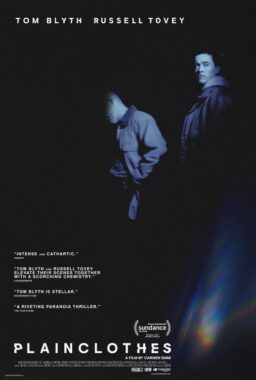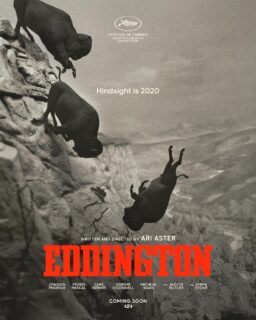“Kramer vs. Kramer,” the drama of a child custody fight, won nine Academy Award nominations on Monday – and so, in a surprise, did “All That Jazz,” about a Broadway director’s self-destruction.
“Kramer vs. Kramer” already has won most of the preliminary movie awards and is favored to win this year’s best picture Oscar, but “All That Jazz,” which has sharply divided audiences and critics, was a sleeper.
“Apocalypse Now,” Francis Ford Coppola’s epic drama about the Vietnam War, followed with eight nominations, and “Breaking Away,” the story of four teenagers growing up in Bloomington, Indiana, had five as the Oscar finalists were announced Monday in Hollywood, California. All four were nominated in the best picture category, along with “Norma Rae,” about a courageous woman textile worker in the South.
The best actor nominees included Dustin Hoffman, who starred in “Kramer vs. Kramer” as an advertising executive who suddenly found himself raising his young son; Roy Scheider, who played the director in “All That Jazz”; Jack Lemmon, who was a stubborn technician in a nuclear power plant in “The China Syndrome”; Al Pacino, a harassed lawyer in “… and Justice for All,” and Peter Sellers, a simple gardener whose banalities were mistaken for wisdom in “Being There.”
Jane Fonda, who already has won two Oscars, was nominated in the best actress category for her performance in “The China Syndrome.” She played a television news reporter who stumbled across a cover-up at a nuclear plant. The other best actress nominees were Jill Clayburgh, as a schoolteacher who fell in love in “Starting Over”; Sally Field, as the mill worker in “Norma Rae”; Marsha Mason as an embattled newlywed in “Chapter Two,” and Bette Midler, as a self-destructive rock singer in “The Rose.”
The best supporting actress category included Meryl Streep, who played Hoffman’s wife in “Kramer vs. Kramer” but was nominated in a supporting category because she was onscreen much less than Hoffman. Other nominees were Jane Alexander, who played Streep’s best friend in “Kramer vs. Kramer”; Barbara Barrie, who was the hero’s mother in “Breaking Away”; Candice Bergen, who divorced Burt Reynolds in “Starting Over,” and Mariel Hemingway, who was Woody Allen’s teenage girlfriend in “Manhattan.”
Best supporting actor nominees included Melvyn Douglas, a two-time Oscar winner, who was named for his performance as a dying billionaire in “Being There.” Douglas, 79, was joined in the supporting actor category by 6-year-old Justin Henry, who played the child in “Kramer vs. Kramer.” Others nominated were Robert Duvall, who played a berserk army colonel in “Apocalypse Now”; Frederic Forrest, Bette Midler’s chauffeur and lover in “The Rose,” and Mickey Rooney, a horse trainer in “The Black Stallion.”
The best director category included the directors of four of the five best picture nominees, but Martin Ritt, director of “Norma Rae,” was overlooked in favor of Edouard Molinaro, director of the French comedy “La Cage aux Folles.” That nomination was possibly in amends for the fact that “La Cage aux Folles,” the most profitable foreign film ever released in the United States, found itself ineligible for nomination in the best foreign film category because of a technicality in Academy rules.
The other best director nominees were Bob Fosse, whose “All That Jazz” closely paralleled events in his own life; Coppola, who mortgaged all of his holdings to complete the ambitious and expensive “Apocalypse Now;” Peter Yates, the British director who caught the rhythms of small town America in “Breaking Away,” and Robert Benton, who wrote and directed “Kramer vs. Kramer.”
There were more than a few surprises when the nominations were announced Monday. The nine nominations for “All That Jazz” were unexpected; it was a film audiences either loved or hated, but the film industry professionals who vote for the Academy Awards must have admired its undeniable craftsmanship. “Manhattan,” by Woody Allen, whose “Annie Hall” won the best picture Oscar two years ago, was thought to be a top contender for nominations, but was all but overlooked. Two possible nominees for best supporting actor – James Woods, the killer in “The Onion Field,” and Paul Dooley, the father in “Breaking Away” – must both be wondering today how 6-year-old Justin Henry edged them out.
Dudley Moore and Bo Derek both were favored for nominations for the phenomenally successful “10,” but the movie was all but overlooked. Martin Sheen, who had the grueling lead in “Apocalypse Now,” didn’t get nominated. In the best song category, it was notable that the only hit song from a 1979 movie, Barbra Streisand’s title song from “The Main Event,” was not nominated.
Nominations in each of the Oscar categories are made by voters who work in that category: Actors nominate actors, directors nominate directors, and so on, with everybody voting in the best film category. Then all 3,604 Academy members vote on the finalists.
This year’s 52nd annual Academy Awards, emceed for the second time in a row by Johnny Carson, will, be held April 14 at the Los Angeles Music Center.
The best song category has been notorious in recent years for overlooking many of each year’s hit movie songs (nothing from “Saturday Night Fever” was named, for example, two years ago), and this year’s finalists are no exception. Songs nominated were “It Goes Like This” from “Norma Rae”; “The Rainbow Connection” from “The Muppet Movie”; “Through the Eyes of Love” from “Ice Castles”; “I’ll Never Say Goodbye” from “The Promise,” and “It’s Easy to Say” from “10.”
In the best foreign film category, Volker Schlondorff’s “The Tin Drum” (West Germany), which shared the grand prize at Cannes with “Apocalypse Now,” became the immediate front-runner in a field that included the comparatively unknown “The Maids of Wilco,” from Poland; “Momma Turns a Hundred,” from Spain; “A Simple Story,” from France, and “To Forget Venice,” from Italy.
Best screenplay written directly for the screen: “All That Jazz,” story and screenplay by Robert Alan Aurthur and Bob Fosse; “…And Justice For All,” story and screenplay by Valerie Curdin and Barry Levinson; “Breaking Away,” story and screenplay by Steve Tesich; “The China Syndrome,” story and screenplay by Mike Gray, T. S. Cook and James Bridges; “Manhattan,” story and screenplay by Woody Allen and Marshall Brickman.
Best screenplay based on material from another medium: “Apocalypse Now,” screenplay by John Milius and Francis Coppola; “Kramer vs. Kramer,” screenplay by Robert Benton; “La Cage aux Folles,” screenplay and adaptation by Francis Veber, Edouard Molinaro, Marcello Danon and Jean Poiret; “A Little Romance,” screenplay by Allan Burns; “Norma Rae,” screenplay by Irving Ravetch and Harriett Frank Jr.
Cinematography: “All That Jazz,” Giuseppe Rotunno; “Apocalypse Now,” Vittorio Storaro; “The Black Hole,” Frank Phillips; “Kramer vs. Kramer,” Nestor Almendros; “1941,” William A. Fraker.











